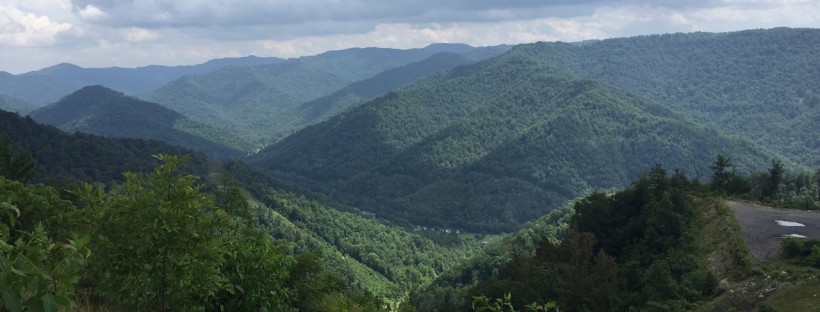The Geographical and Historical Region of Appalachia
The Appalachian Mountains form the spiny backbone of the Eastern United States. The mountain stretch, which the Federal Government defines as The Appalachian Region, runs from Southern New York to Northern Georgia and Alabama. It contains 399 counties in 13 states–parts of Alabama, Georgia, Kentucky, Maryland, Mississippi, New York, North Carolina, Ohio, Pennsylvania, South Carolina, Tennessee, Virginia and West Virginia. This wide tract of land includes mountains and valleys, lakes and rivers, cities and farms and is home to people of all backgrounds, ages, income levels, and cultures.
The early settlers to the Appalachian region were mainly of Scotch-Irish or German descent, who came during the 1840s as a result of the Potato Famine and in search of religious and economic freedom. The terrain and lack of roads made transportation difficult; many Appalachians lived in loosely integrated and self-sufficient communities and depended heavily on the family farm. Family was important and prestige was not based so much on economics and power, but rather on values and respect generated by the community.
The history of much of Central Appalachia is that of unfortunate exploitation of resources, land and people. Much of Appalachia saw this in the form of large coal companies that moved into the area in the 1870s when coal was discovered beneath the beautiful rolling hills. Coal camps sprung up all over the region as land ownership and mineral rights were transferred from the Appalachian people to wealthy landowners and coal barons. The boom and bust of the industry was felt throughout the region as jobs were lost when machines took over, when demand was down and when most of the coal had been stripped from the land. When the coal companies left, the people of Appalachia were left with scarred mountaintops and hillsides, little material wealth, and wariness of the outsiders who had disrupted their peaceful lifestyle.
Appalachian Culture
Hot chocolate on a cold day; ice cold lemonade on a hot day; warm hugs; good conversation; people who wave even if they don’t know who you are; and an overwhelming sense of hospitality when you walk into someone’s home–such is the way of many of the people of Appalachia. Loyal Jones, retired director of the Appalachian Center and professor of Appalachian Studies at Berea College, has identified some key values of the Appalachian people: “We mountain people are a product of our history and the beliefs of our forefathers. We are a traditional people, and in the isolated rural setting that was our home, we clung to things of the past. Partly this was because, for so many years, we did not have much trust with the outside world. We became self-reliant. We sought our freedom from entanglements. We gained solitude, one of the things we cherish most of all. All of this was both our strength and our undoing.” Jones’ list of Appalachian values is as follows:
– Religion
– Independence, Pride of self-reliance
– Sense of Beauty
– Familism
– Humility and Modesty
– Patriotism
– Sense of Humor
– Neighborliness and Hospitality
– Personalism
– Love of Place
Volunteers coming to Nazareth Farm can expect to meet people who embody the values of a traditional, spiritual and beautiful culture. “There is a uniquely compelling quality about being Appalachian that turns the hillbilly stereotype on its head. It rings out in history, landscape, song, dance, craft, poetry. It is profoundly touched with tragedy, pride, spirit, determination, deeply etched in beauty.” In a world where these values are often lost, it is comforting to know that the people of Appalachia are getting it right. We think you’ll agree.
Sources: Appalachia Social Context Past and Present, The Coalition for Appalachian Ministry

